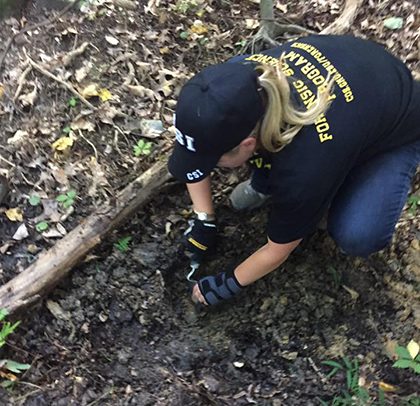
Photo provided.
The opening of ŃÇÖŢAV’s new Forensic Science Research and Training Laboratory in the Spring 2021 semester establishes Mason as a leader in forensic anthropology and investigations and a valuable community partner with law enforcement.
With the addition of the new five-acre facility on its Science and Technology Campus in Manassas, Virginia, Mason becomes just the eighth location in the world capable of performing transformative outdoor research in forensic science using human donors.
The facility will offer a unique learning experience for Mason students, allowing them to perform cutting-edge forensic science research pertinent to the criminal justice system while developing highly sought-after skills as career-ready graduates.
The lab will also serve as a proving ground for technological advances in applied forensic sciences. The transdisciplinary collaboration is housed within Mason’s and administered by the Program.
, the director of the Forensic Science Program and a former FBI profiler, called the new facility an “incredible initiative that will distinguish Mason in the field of forensic science and related sciences for years to come.”
“Our vision is to be interdisciplinary and collaborative in our pursuit of the latest high-tech and hands-on course work for our students to set a new bar for a wide range of research, from scent dog/chemistry research to determining the postmortem interval that is relevant to our unique environment,” she said.
The laboratory will receive its first human remains late in the spring semester. It is dedicated to studying the processes of human decomposition in various conditions for the purposes of solving crimes.
This will include the examination of environmental changes, soil composition, animal scavenging, floral diversity and insect species variations. This information will be used for medical-legal applications and law enforcement training.
“Having such a unique facility here at George Mason will allow our students to use their creativity to explore operational-based research that will help us identify the unidentified, locate clandestine graves, assist in unbiased prosecutions and exonerate the innocent,” said , an associate professor of Forensic Science.
The laboratory will serve as a focal point where local, state and national law enforcement agencies can learn to identify the unidentified and help solve crimes.
“We’ve significantly invested in our innovative Forensic Science program at Mason to offer students and partners access to unparalleled academic, research and training experiences,” said Fernando Miralles-Wilhelm, dean of the College of Science. “First the Crime Scene House and the DNA Lab offer authentic, hands-on experiential learning opportunities, now this Forensic Science Research Laboratory will present unique research opportunities and professional pathways with the D.C. federal agencies, military and law enforcement organizations in close proximity.”
Donations of human remains to the research facility will come through the Virginia State Anatomical Program (VSAP), a part of the Virginia Department of Health.
“This research opportunity affords us a unique opportunity to advance forensic science and develop a much deeper understanding of the environmental issues that affect human decomposition and the associated evidence that allow the science to tell the stories for those who can no longer speak for themselves,” said Maj. Christian P. Quinn, commander of the Cyber and Forensics Bureau for the Fairfax County Police Department.
The laboratory’s unique position near Washington, D.C. presents opportunities to partner with federal and state agencies and U.S. military organizations, such as the Virginia State Medical Examiner, Virginia Department of Forensic Sciences, University of Virginia’s Applied Biodynamics Laboratory, Prince William County Police, U.S. Army Criminal Investigation Division, the Smithsonian Institution, Naval Criminal Investigative Service and the Department of Homeland Security among others.
“This facility will be breaking ground, setting new standards, researching new forensic techniques and, ultimately, solving cases,” O’Toole said.
Detailed measures have been put in place to assure security and environmental integrity.
The University of Tennessee in Knoxville established the first outdoor human remains facility in 1981, followed by Texas State University, Sam Houston State University, Western Carolina University, Southern Illinois University, Colorado Mesa University and the University of South Florida.
Mason’s facility will be the only one in the mid-Atlantic region.
